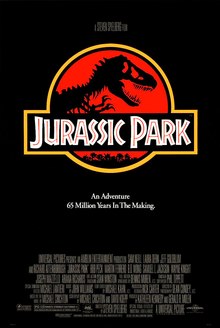 |
| I can hear the theme starting up... |
The film, of course, is based on a book. And, of course, the book is well worth reading. The story is slightly different, in particular the ending is less 1990's Hollywood. In addition many of the memorable scenes from the sequel movies can be found in the book (the aviary from JP III in particular struck me as being ripped straight from the novel).
The book was also interesting for non-dinosaur related reasons. Each chapter title page featured an evolving line drawing, with a slightly abstract title ("First Iteration", "Second Iteration", etc), and some text underneath that was always a bit ominous and technical sounding to my young mind. Now I recognise the evolving pattern as a dragon curve fractal (Wikipedia claims the specific instance is the Heighway dragon, or Jurassic Park dragon). I do have some feint recollection that deliberate errors were introduced - meaning to foreshadow and reinforce the regular patterns of man being disrupted by nature trying to find a way - but I could just be making that up.
However, the things that have really stuck with me from Jurassic Park are its theme of science, curiosity, and responsibility. Dr. Ian Malcolm's haunting line:
Yeah, yeah, but your scientists were so preoccupied with whether or not they could that they didn't stop to think if they should.is something to reflect upon. Even in the little sub-section of computer science that I'm involved in, it's very easy to dream up seemingly good ideas, without necessarily thinking through all the consequences. The idea that sparked this post's self-indulgent nostalgia was an early morning reverie on how awesome Google Glass is going to be - and the crazy things that could be done with it while (say) teaching. For example, lecturing with an autocue in your eye. Or in a tutorial you could face recognise the students, work out automatically who was missing, and get the display to provide small little graphs to indicate progress. It would be amazing, you could work out who needed help - even before they knew to ask. But then Malcom's quote reminds you to think. Would students react well to being so obviously tracked, logged and monitored? What are the privacy concerns? I'm sure I could work out ways of doing all of the above if I wanted to,and the challenge of making it all work is something I'd find ridiculously enjoyable (it's like a game or a puzzle to glue such technologies together and work around current limitations). But, like breeding velociraptors, can it be made safe? Is it a good idea at all?
Away from such moral ambiguities, let me end on a lighter note. Any reasonable discussion of Jurassic Park has to include a nod to Lex Murphy's cry of delight at:
It's a UNIX system, I know this!The graphical viewer she uses in the film was a real program, fsn (3D File System Navigator, developed by Silicon Graphics). There's a linux reimplementation, fsv, which is great fun to play with.
And I think I'm all dinosaured out.